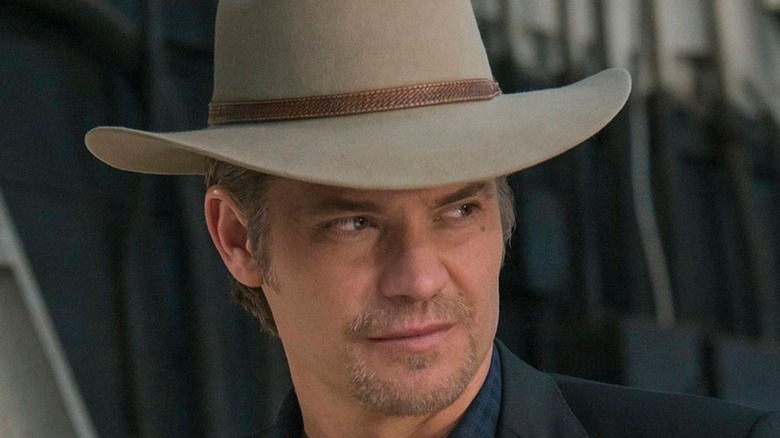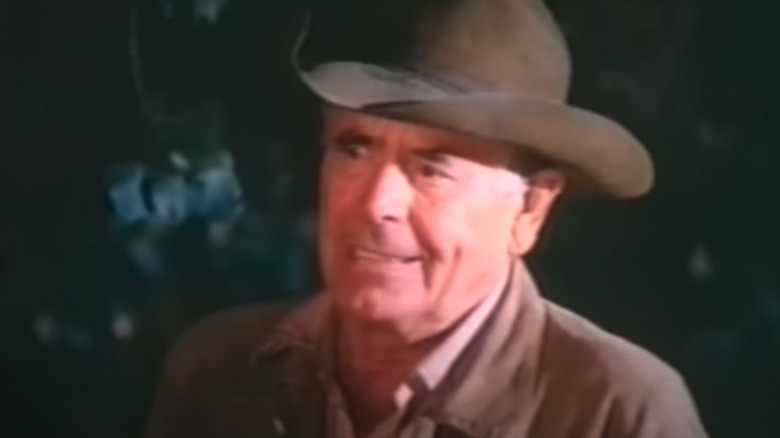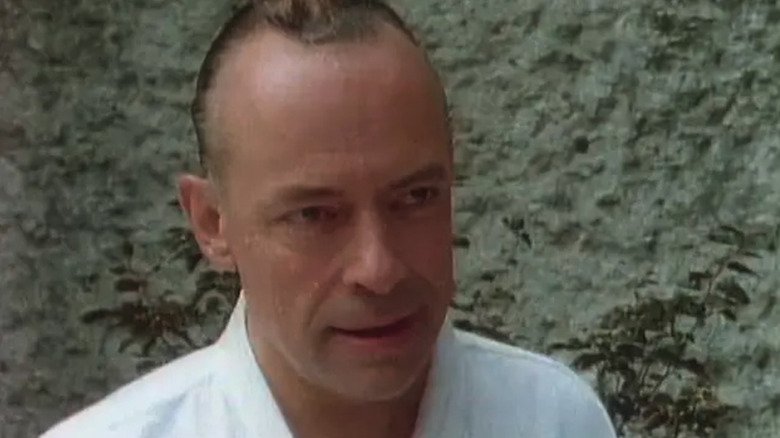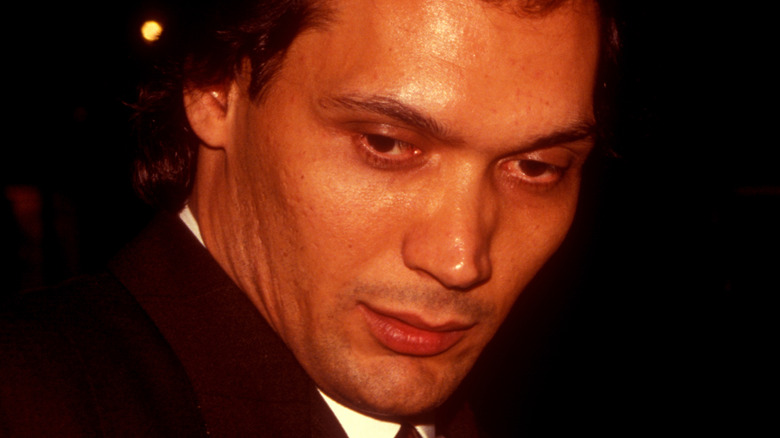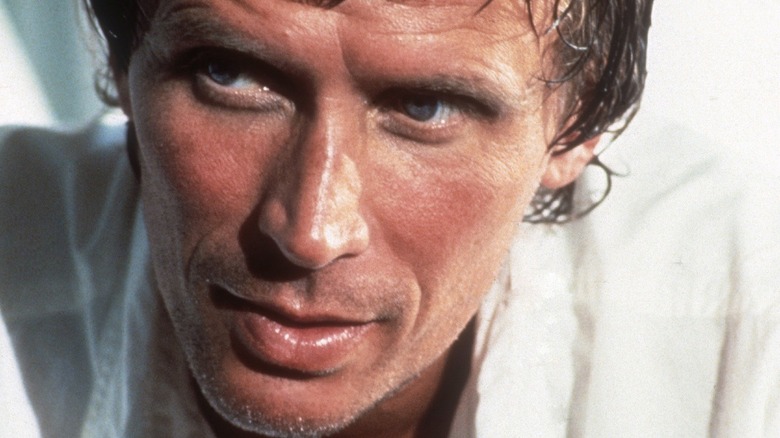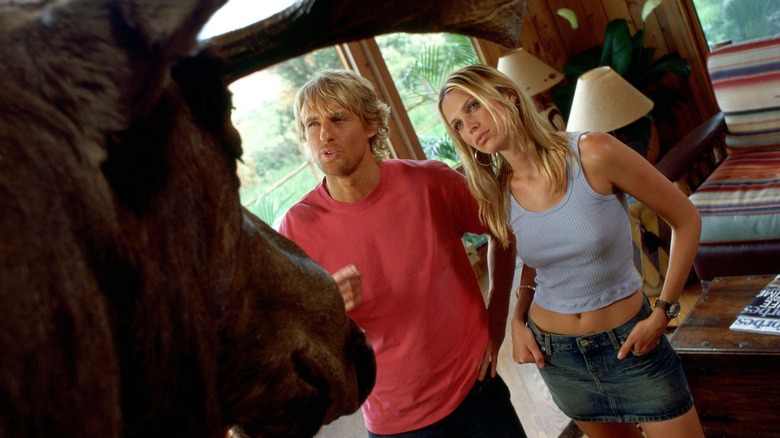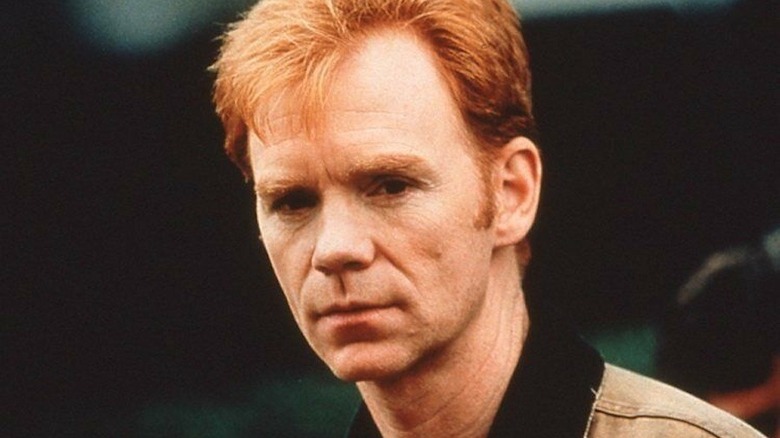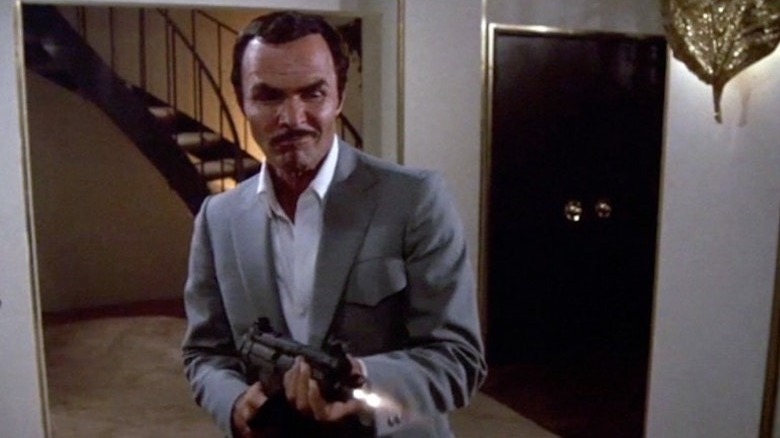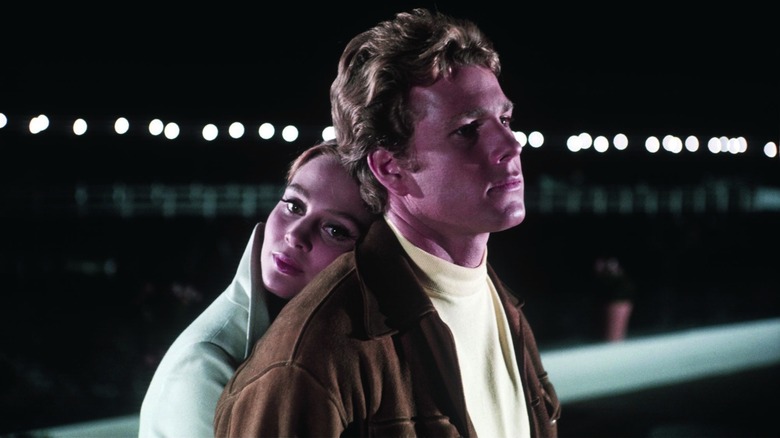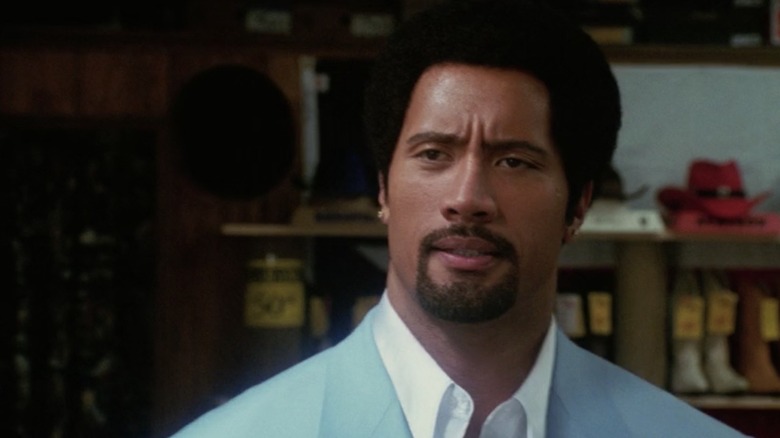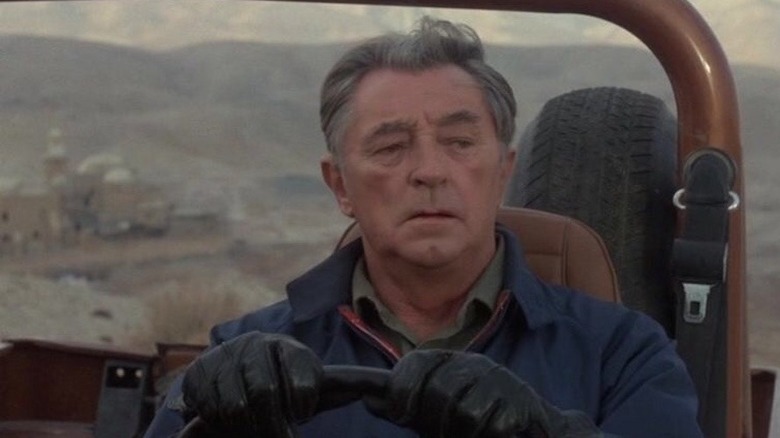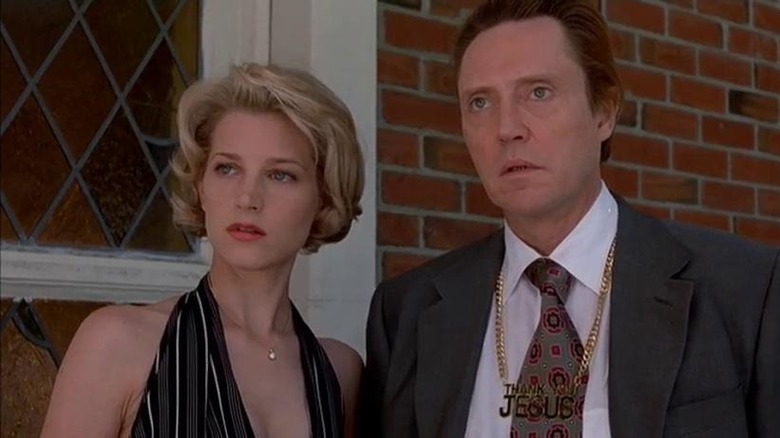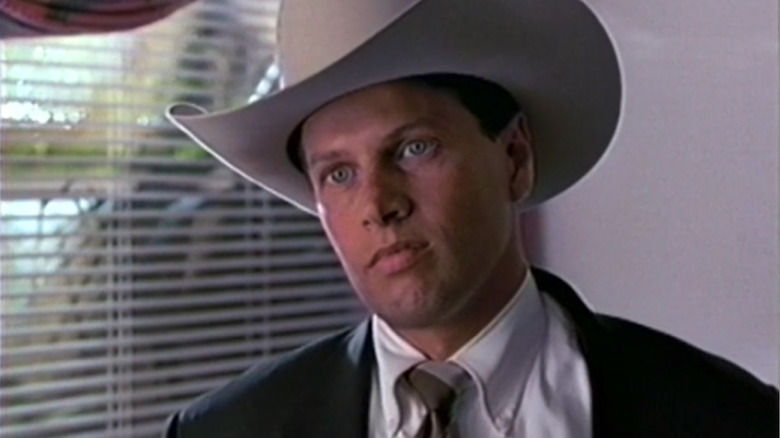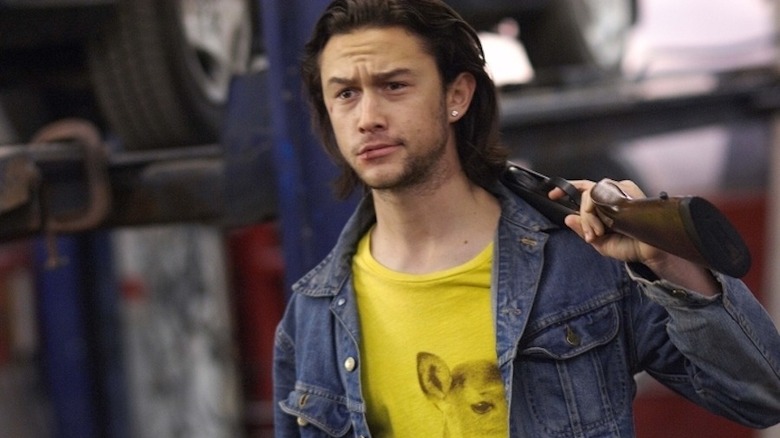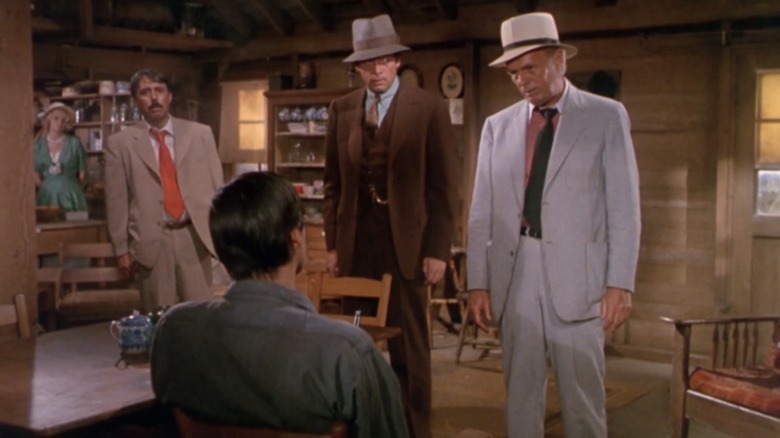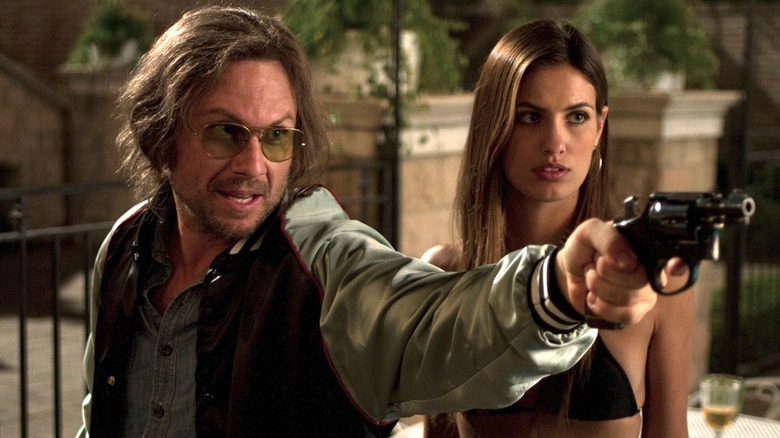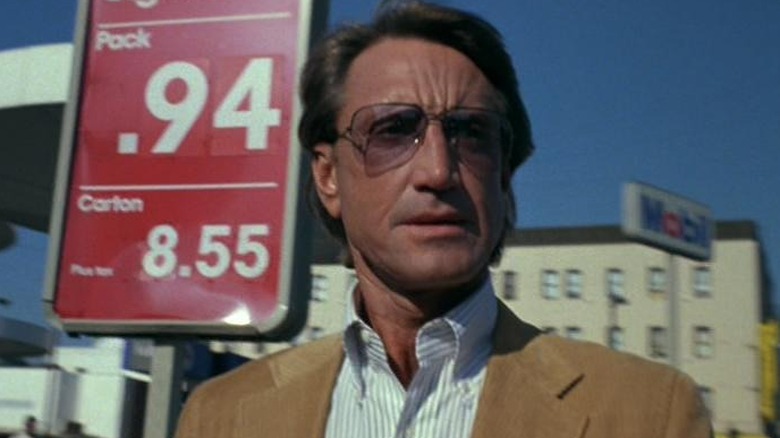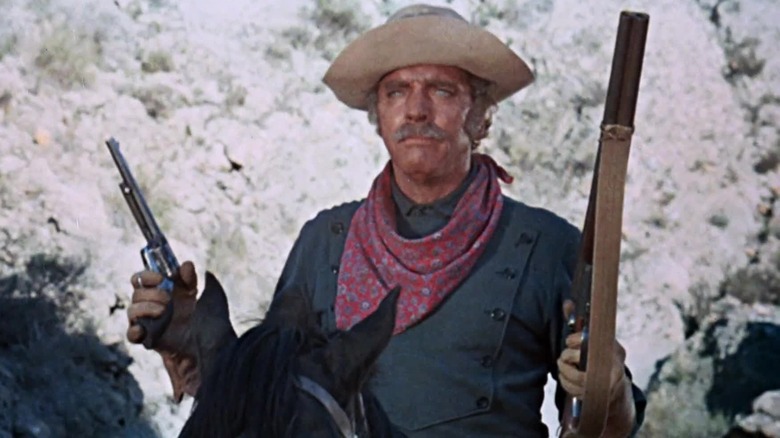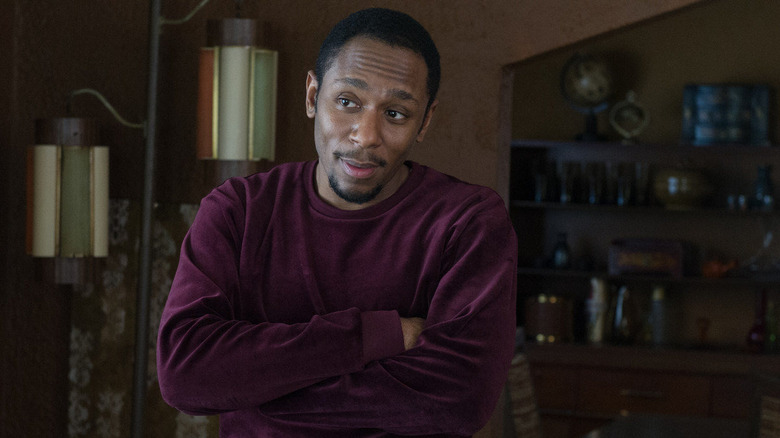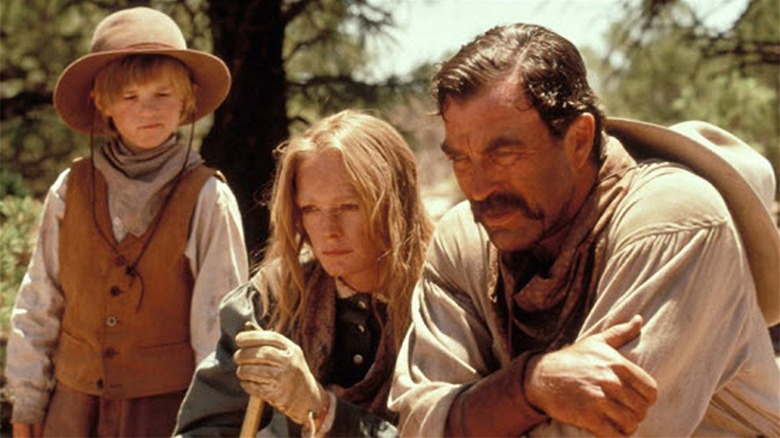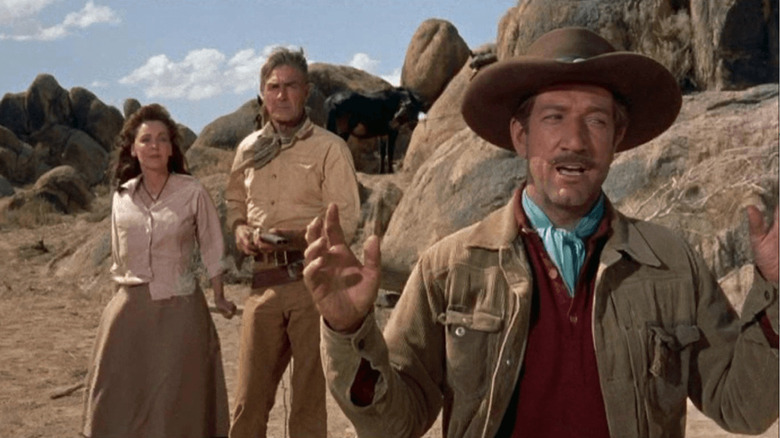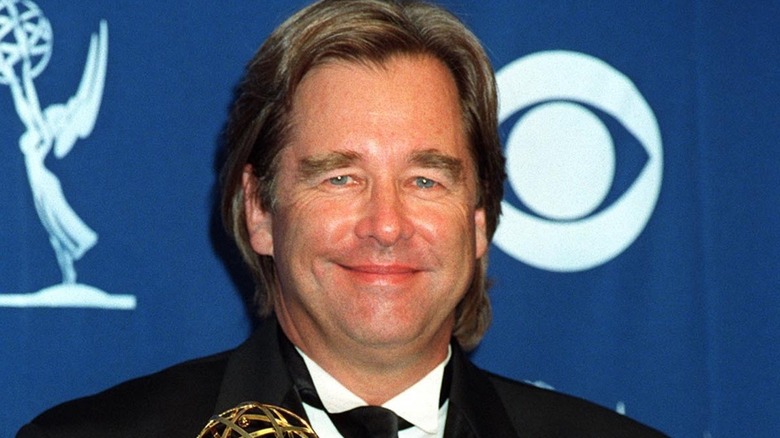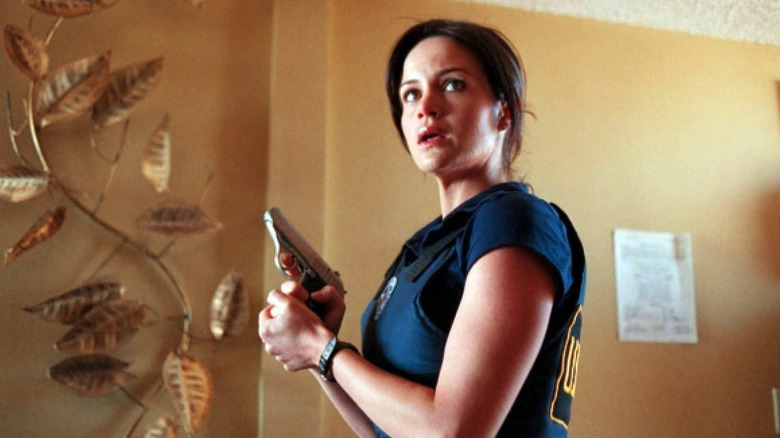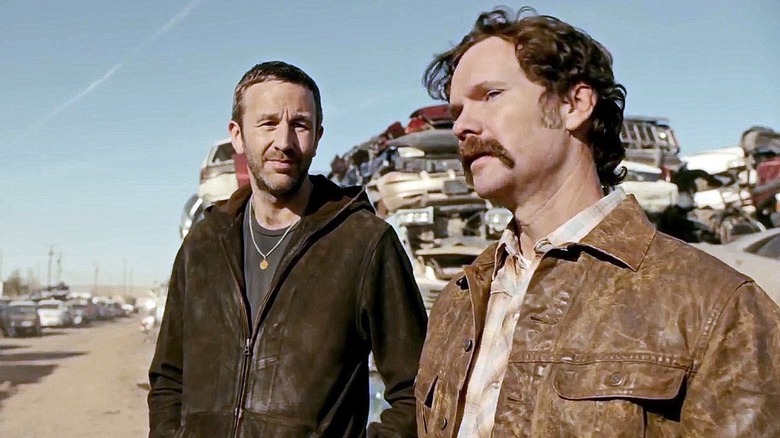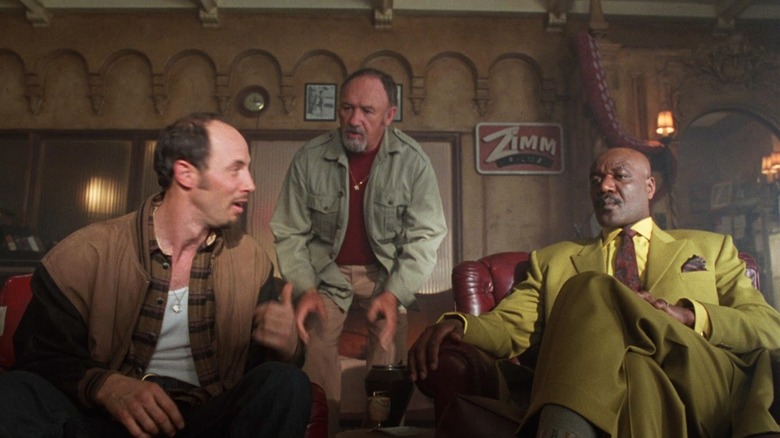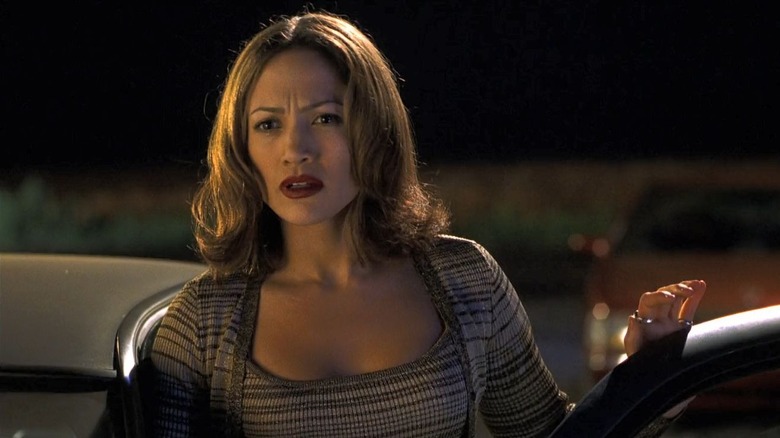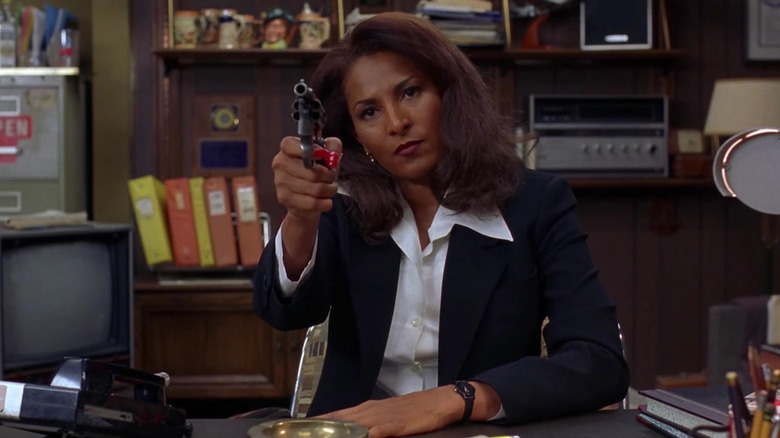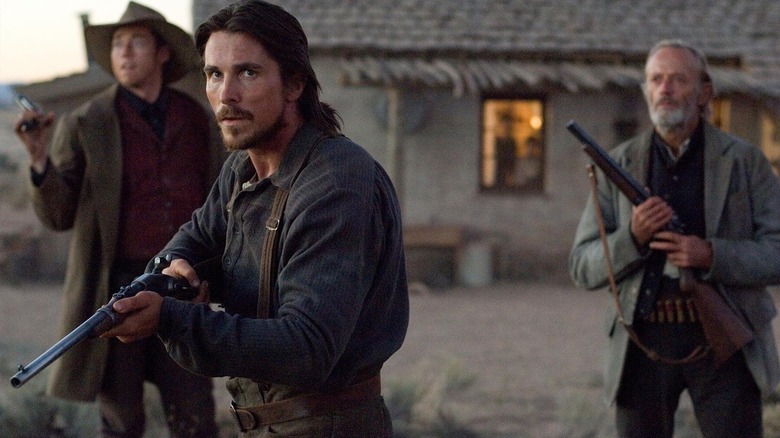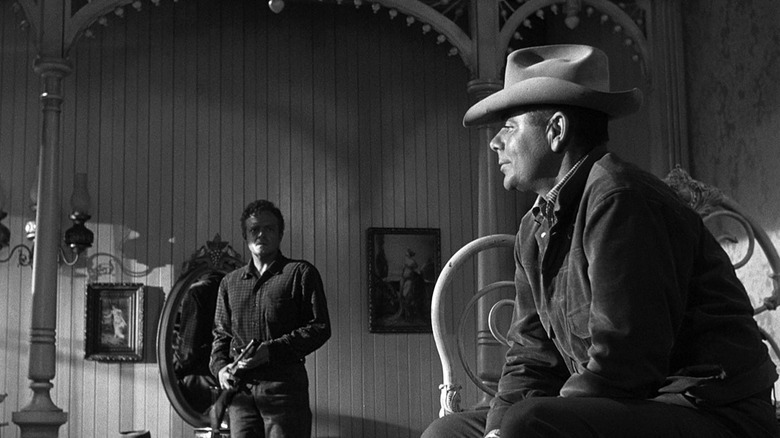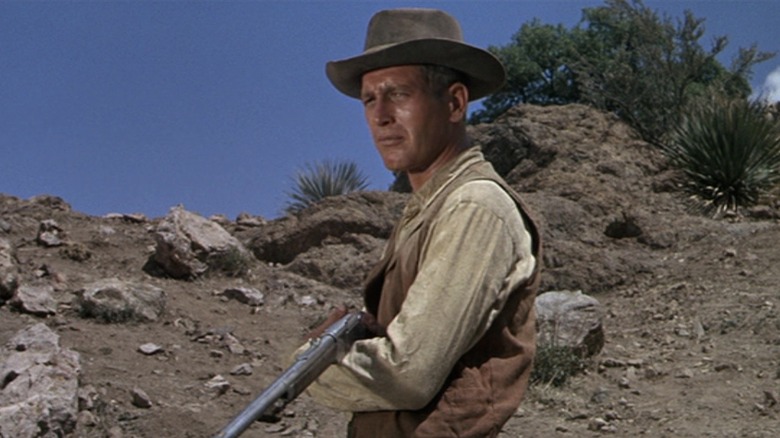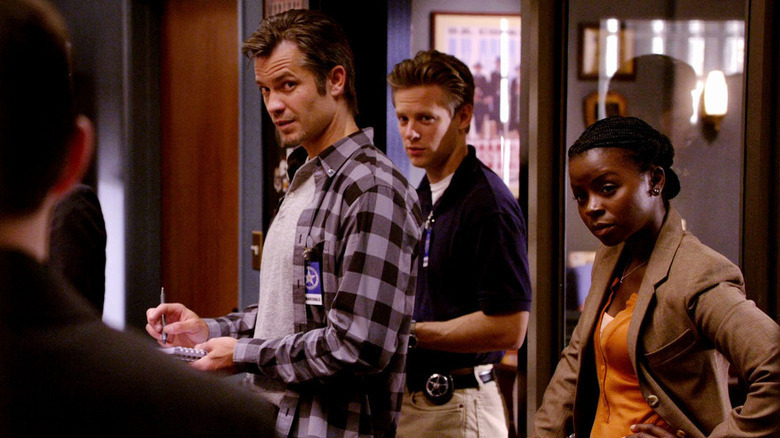Every Elmore Leonard Adaptation Ranked Worst To Best
A writer of pulp cowboy stories early in his career, legendary crime author Elmore Leonard rose to prominence in the 1950s. Right out of the gate, several of his Western tales were quickly adapted for the screen, with Paul Newman's "Hombre" and Randolph Scott's "The Tall T" arriving in theaters before that decade was done. From Westerns he moved to mysteries, and then to crime fiction, producing a number of stories that would eventually make it to the screen as well.
Over the course of his career, dozens of his works have been adapted into movies and television shows, with some becoming critically acclaimed. The most famous today is arguably "Justified," the story of smooth, snarky, sharp-shooting Deputy U.S. Marshal Raylan Givens, with "Deadwood" star Timothy Olyphant becoming an all-time legend for his performance as the intrepid lawman. With a penchant for quirky characters, snappy dialogue, and offbeat adventures, some of the best Elmore Leonard stories have become screen greats, including a Tarantino favorite, a George Clooney classic, and a Christian Bale barn-burner.
From pulpy criminal capers to gunslinging Westerns, Leonard's adaptations run the gamut. So flick those ashes, load up the getaway car, and don't forget your six-shooter, because we're going on a heist of our own, ranking every Elmore Leonard adaptation worst to best.
30. Border Shootout
One of the biggest cowboy stars of the 1940s and '50s was Glenn Ford, who'd appeared in a number of cowboy adventures, including Leonard's own "3:10 to Yuma" in 1957. In 1990, Ford would return to the genre in the much less heralded "Border Shootout," an adaptation of another Elmore Leonard classic, his 1954 novel "The Law at Randado." Unfortunately, Ford isn't really the star of the film, with Cody Glenn nabbing the lead role of young deputy Kirby Frye, while the veteran star actor plays the supporting role of fellow lawman Jeff Danaher.
But the story is really about the fresh-faced young rancher Frye who becomes a reluctant deputy sheriff after the despicable Phil Sundeen (Jeff Kaake) and his gang of outlaws try to bring their own brand of power to a lawless town. A poor excuse for old-school Western-style punch-ups, this kind of low-budget cowboy adventure was well past due by the 1990s, looking like a cheap stage play instead of a first-rate movie, even by television standards.
An overly simple story with no themes or deeper meaning, it loses all the pulpy fun of Leonard's book by way of bad acting and B-movie level costuming and sets. If you're a fan of Ford it may be worth seeking out, but otherwise is an easy skip if you're looking for a Leonard adaptation.
29. Split Images
The late '80s saw Elmore Leonard writing a series of original TV movies not based on any book, but centered on a wild Western renegade. Perhaps it was the success of these more original made-for-television entries that saw network TV seek out some of his other works for adaptation, because the early '90s saw a few more of his books make their way to the small screen. This includes the 1992 TV movie "Split Images," based on Leonard's 1981 novel about a wealthy man who turns to murder.
Gregory Harrison ("Falcon Crest") stars as Robbie Daniels, a charming and handsome multi-millionaire who harbors a dark secret: he's a bloodthirsty killer, and the only thing he loves more than murder is chronicling his killings on videotape. But when reporter Angela Nolan (Rebecca Jenkins) connects the clues that lead to his doorstep, no one takes her seriously except Detective Bryan Hurd (Nicholas Campbell), who helps her dig into Daniels' activities.
Though billed as being as brilliant as a Hitchcock thriller, "Split Images" is anything but, while the limitations of network TV meant toning down everything that made Leonard's original book so chilling.
28. Glitz
By the 1980s, Elmore Leonard's stories had been adapted into more than a few successful films, with the likes of "Hombre" and "Mr. Majestyk" proving his works were well-suited to the big screen. So when he dropped a new book in 1985 titled "Glitz," it wasn't long before Hollywood came calling, and a few years later in 1988 a TV movie adaptation hit the small screen, led by television stars Jimmy Smits ("L.A. Law") and Markie Post ("Night Court").
Smits stars as Vincent Mara, a dedicated cop out of Miami — a setting Leonard favored — who is spending a sabbatical in Puerto Rico. But trouble strikes when the murder of a local cab driver and the mysterious death of his ex-girlfriend in Atlantic City reveal troubling connections to a violent ex-con he once testified against. With the help of a sultry casino lounge singer (Post), Mara will use hard-nosed detective skills — and a barrel full of bullets — to track down the killer.
Unfortunately, what could have been an intriguing crime noir turns into a story full of plot contrivances riddled with cliches and low budget action that doesn't thrill — a real problem for a thriller. A movie that feels quickly slapped together, it offers up none of the snappy dialogue and clever surprises that Leonard is known for.
27. Cat Chaser
In the mid 1980s, Peter Weller came to stardom off the back of "RoboCop," while Kelly McGillis earned notoriety for her role in "Top Gun." But a few years later, they teamed up for a disappointing adaptation of an Elmore Leonard caper story, "Cat Chaser." Once again set in Miami, and this time jaunting to the Dominican Republic in the Caribbean, it tells the story of an ex-military officer caught up in a web of lies and murder.
Trading his police badge and robot armor for a military uniform, Weller plays veteran soldier George Moran, who fought in the Dominican Republic some 20 years before. Back on the island in search of a woman who had saved his life, he's drawn into a love affair with Mary DeBoya (McGillis), the alluring wife of a Dominican general — but Moran gets even more trouble than he expected when he's ensnared in a plot to steal $2 million from Mary's military husband.
Though it boasts some big names from the era, and has a story tailor-made for an engaging heist film, "Cat Chaser" is a movie that's far less than the sum of its parts. Reduced to its most one-dimensional aspects, it becomes a quasi-erotic thriller with stiff performances and a muddled story that falls completely on its face.
26. The Big Bounce (2004)
In the 1990s and early 2000s, a number of hit movies were made from some of Elmore Leonard's most respected novels. This included Tarantino's "Jackie Brown," the John Travolta comedy "Get Shorty," and neo-noir crime adventure "Out of Sight" starring George Clooney and Jennifer Lopez. With this resurgence came more interest in the author's work, and in 2004, a remake of a previous adaptation hit the big screen, with Owen Wilson and Morgan Freeman starring in a new version of the 1969 film "The Big Bounce."
Wilson plays a Hawaii beach bum and small-time miscreant named Jack Ryan (not that Jack Ryan). The cops hate him, the locals loathe him, but one eccentric town judge (Freeman) has a soft spot for him, hiring him as a handyman at the resort he owns on the island. But when he meets Nancy Hayes (Sara Foster), the beautiful young mistress of millionaire developer Ritchie Harris (Gary Sinise), they become thick as thieves, getting into all sorts of trouble together — and things really go haywire when Hayes hatches a plan to make off with the tycoon's vast fortune.
Today, "The Big Bounce" barely registers on review aggregator Rotten Tomatoes, whose critical consensus tears it to shreds. "Lazily crafted and light on substance," they say, "[it] takes few chances and strands its promising cast in a subpar adaptation that fails to do its source material justice." Ouch.
25. Gold Coast
In the mid 1990s David Caruso was one of the hottest names on TV, the star of the prime time hit "NYPD Blue" alongside Dennis Franz. But that wasn't enough for him, as the actor had dreams of parlaying his television fame into big screen leading man status. Unfortunately his first big movie, 1995's "Kiss of Death," was a dismal failure, and so Caruso compromised with a TV movie two years later: "Gold Coast," directed by "Cat Chaser" star Peter Weller and based on the 1980 novel by Elmore Leonard.
A story of a big time mobster's jilted widow, it introduces us to Karen (Marg Helgenberger), the floozy wife of wealthy gangster Frank DiCilia (Richard Bradford). When Frank dies, his fortune goes to Karen, but only under the condition that she never takes a new lover. When she's approached by Maguire (Caruso), a small-time hood who's owed some of Frank's money, sparks fly and the two lovebirds find themselves at the mercy of Roland, the bodyguard assigned to make sure she never shacks up with another man.
A terribly disappointing affair, "Gold Coast" mostly wastes a good cast with mediocre TV direction and a haphazard script. A big swing and a miss for Caruso, too — the actor never would have his Hollywood hits. Instead he'd return to TV, starring in "CSI: Miami," and wouldn't look back.
24. Stick
The 1983 novel "Stick" from Elmore Leonard was credited with a resurgence in his career, with the New York Times' review of the book saying the author "gives us as much serious fun per word as anyone around." Snatched up by Universal Studios, the story landed in theaters as a big-screen crime drama just two years later. Led by star '70s Burt Reynolds, its cast included Candice Bergen, George Segal, and Charles Durning, in a story about a small-time gangster hiding out from some thugs by taking a job as a driver for a millionaire client.
Directed by Reynolds, the film feels a bit too much like a vanity project, as he's terribly miscast in the role of a small-time crook. Without a skilled filmmaker behind the camera, many mocked the star for his inexplicable choices, with the same paper that praised the book lambasting the movie. "[Burt Reynolds'] eagerness to film Mr. Leonard's Florida-based crime drama is understandable; the book has crackling tough-guy dialogue and a story that practically tells itself," said the Times. "What is less understandable is his insistence on reshaping such ostensibly foolproof material to support a star turn."
It's more heavy-handed than the novel with a far less intriguing story, and Leonard — who'd written the script — made his dislike known in a 2004 interview with the Guardian, insisting, "I didn't recognize my screenplay at all in that movie."
23. The Big Bounce (1969)
Decades before Owen Wilson, Morgan Freeman, and Gary Sinise starred in their version of Elmore Leonard's story "The Big Bounce," there was another version on the big screen. In 1969, Tatum O'Neal, James Daly, and Van Heflin starred as Jack Ryan (still not that Jack Ryan), real estate developer Ray Ritchie, and a friendly town judge. This one was set in California, not Hawaii, and Jack goes to work at a nearby motel, not a major beach resort, but the plot beyond those small changes is largely the same.
While a bit more film noir and less goofy than the 2004 remake, the 1969 version of "The Big Bounce" has a bit more charm and slightly more class ... but not much more. It follows the same plot more or less, with Ryan a drifter who shacks up with seductress Nancy, mistress of a local tycoon, and together they go on a petty crime spree before trying to swindle her other lover out of his fortune.
In a 2009 interview with the L.A. Times just a few years before his death, Leonard called the 1969 film "the second-worst movie ever made" of one of his books — right behind the remake from 2004. While we can't rank either in quite the same way as he did, we do agree that neither of them are very good.
22. Be Cool
In 1995, Elmore Leonard had big screen success with his 1990 novel "Get Shorty," the story of a mobster who gets into the movie business. With the movie a hit, the author turned around and wrote a sequel in 1999 titled "Be Cool." And while it took some time to get together, the follow-up did finally make its way to cinemas in 2005, with John Travolta and Danny DeVito returning nearly a decade after the first film. Joining them were stars Uma Thurman, Cedric the Entertainer, Vince Vaughn, and Dwayne "The Rock" Johnson.
Having conquered Hollywood as a movie producer, mobster Chili Palmer (Travolta) sets his sight on the music industry. When his old friend Tommy (James Woods), a music mogul, is gunned down by Russian gangsters, Chili steps in to take over the company with the help of his friend's widow (Uma Thurman). Together, they must contend with foreign mobsters and their murderous henchman as well as temperamental rock stars and out-of-control rappers who are just as troublesome as any hitman.
With guest appearances from Aerosmith, the Black Eyed Peas, Wyclef Jean, Gene Simmons, RZA, and more, the movie is wall-to-wall stars. But compared to its predecessor, "Be Cool" is a lackluster adaptation that relies a bit too much on meta humor and one-note cameo jokes, lacking the zip and pizazz of "Get Shorty."
21. The Ambassador
The first of two adaptations in three years of the Elmore Leonard novel "52 Pick-Up," the 1984 Cannon Films production "The Ambassador" takes a very loose interpretation of the book. Starring Robert Mitchum, Ellen Burstyn, Rock Hudson, and Donald Pleasance, it boasts plenty of recognizable names, but fans of Leonard's original book won't recognize much else beyond its most basic story elements. Where the book sees a cheating husband blackmailed in an attempt to ruin his wife's career, this adaptation swaps the roles with Burstyn starring as Alex Hacker, the wife of a prominent diplomat who engages in an illicit affair.
In this version, it's Mitchum as Peter Hacker, U.S. Ambassador to Israel, who in a storyline invented for the film is attempting to push for peace between Israelis and Palestinians when they're attacked by those who want to disrupt his negotiations. But matters are further complicated when blackmailers threaten to reveal evidence of his wife's affair — with a member of the PLO — to the President of the United States.
With an unnecessarily tangled plot that even includes a KGB assassin to top it off, "The Ambassador" bears little resemblance to the novel on which it's based. Instead, it feels more like a trendy political thriller than anything Elmore Leonard ever would have dreamed up. Though it's not terrible, it's also not very good.
20. Touch
Quentin Tarantino's "Jackie Brown" wasn't the only movie based on an Elmore Leonard novel to land in theaters in 1997. Heck, it wasn't the only one to star Bridget Fonda, as her comedy "Touch" also hit cinemas that year, based on a book by the author. But this was a different kind of story for Leonard, not the usual heist film or fast-paced neo-noir, or even an old school cowboy movie. Instead, "Touch" is something of a quasi-religious supernatural romance movie, albeit with the author's customary dry wit, kooky characters, and an underhanded scheme for good measure.
Skeet Ulrich stars as an innocent former monk named Juvenal, a young man with the extraordinary ability to steal people's pain with but a touch. When street preacher Bill Hill (Christopher Walken) discovers Juvenal's incredible powers, witnessing him taking away a woman's blindness, he comes up with a way to use him in an elaborate money-making scam. But after recruiting a young woman named Lynn (Bridget Fonda) to help convince the naive Juvenal to join him, she and the young gifted healer fall head over heels for each other, much to Bill's chagrin.
Unlike the much more sparkling and stylish crime comedy "Jackie Brown," it's a mediocre adaptation. A listless comedy with few too many laughs, "Touch" is as middle-of-the-road as they come.
19. Pronto
Elmore Leonard's most famous creation may be Raylan Givens, star of "Justified." But on the page, Givens first appeared as a supporting player in the 1993 crime novel "Pronto," which centered on Miami bookie Harry Arno. A few years later, it debuted as a television movie with "Columbo" star Peter Falk in the lead role, and actor James LeGros as the sharp-shooting Deputy U.S. Marshal. Today, the movie is mostly fun trivia for fans of "Justified" who learn that the character's first appearance onscreen was more than ten years before the show's debut.
But on its own, "Pronto" is a decent if unspectacular crime story, again focusing on eccentric oddball bookie Harry Arno (Falk). For years, Arno's been quietly stealing from the mob he's been working for and the trouble finally catches up to him when a hitman comes to collect. With his girlfriend Doris (Glenn Headley), Arno decides to skip town, escaping the custody of U.S. Marshal Raylan Givens, but it's not long before both Givens and the mafia's henchmen track him to his retreat overseas, setting up a final showdown.
An interesting story with some fun moments, it's fairly average for '90s TV movie fare. But if you're a fan of "Justified" you'll find it an interesting bit of history, as "Pronto" and LeGros — who went on to play local drifter Wade Messer in "Justified" — give a very different take on the character.
18. Killshot
Across six decades, Hollywood's love affair with Elmore Leonard's particular brand of grizzled crime fiction has never seemed to abate. In 2008, another novel, this time 1989's "Killshot," got the big-screen treatment, with a cast of big-name stars that included Joseph Gordon-Levitt, Mickey Rourke, Thomas Jane, Rosario Dawson, and Diane Lane. It tells the story of a pair of ruthless hitmen out to wipe out witnesses who can put them away for a series of murders, and is a bit more violent than some of Leonard's other adaptations.
Rourke plays Armand Degas, aka "The Blackbird," a notorious mob hitman who links up with a young hotshot killer named Richie Nix (Gordon-Levitt). A bit more unstable and a lot more reckless, Richie joins Blackbird's scheme to extort money from the boss of Carmen Colson (Lane), wife of steelworker Wayne (Jane), who gets a look at the two men while they're pulling the job. Their lives in danger, Carmen and Wayne are put into witness protection by the FBI, but Blackbird and Richie just see their government-aided escape as a game of hide-and-seek and go gunning for them.
Not quite as exciting as it sounds on paper, "Killshot" has its moments, and its cast of big names all turn in worthy performances. But as an Elmore Leonard adaptation it's missing his charm, and doesn't have quite enough fast-paced action to help it stand out.
17. The Moonshine War
Elmore Leonard loves certain subjects and locations. Mobsters, drifters, and bitter lawmen, sure, but also stories set in Detroit, Miami, and on tropical islands. One favorite setting is the backwoods of Kentucky where "Justified" took place, but it wasn't the first time he'd set a story there. In the 1974 crime caper film "The Moonshine War" — a title later used for an episode of "Justified," in fact — we meet a group of gangsters in Kentucky during Prohibition, with a cast that includes "M*A*S*H" star Alan Alda and Patrick McGoohan from "The Prisoner."
It's the early 1930s and Prohibition has dragged on in the United States, sparking an explosion of bootleggers and organized crime. Underground stiller John Martin (Alda) gets a visit from his old friend Frank Long (McGoohan), who is now a government agent and obligated to turn him in. But when Long is rebuffed on an offer to let him slide if he'll cut him in on the profits, he calls on a dangerous enforcer who resorts to deadly violence to get him what he wants.
Though the suspense and drama of it all isn't up to par, the film does a good job of capturing the feel of Leonard's book, with a tight story filled with quirky characters and quippy dialogue.
16. Freaky Deaky
In 2013, Elmore Leonard's 1988 novel "Freaky Deaky" was adapted for the big screen as a daring black comedy. From indie director Charles Matthau, it features a batch of oddball actors that perfectly fit Leonard's style, including Christian Slater, Billy Burke, Crispin Glover, Andy Dick, Michael Jai White, and Bill Duke. Set in the 1970s, it tells the story of a former Detroit bomb squad cop (Burke) who turns to a life of crime.
Despite the book being set in the '80s, Matthau moves the action to the more stylish and Leonard-like 1970s, where a disgraced cop and explosives expert joins up with Greta (Sabina Gadecki), an aspiring actor, and a group of would-be revolutionaries who want to get revenge against a powerful but eccentric movie producer (Glover). With the help of a small-time crook named Skip (Slater), this rag-tag gang finds themselves in a series of deadly double crosses, dangerous liaisons, and plenty of sex, lies, and idiot takes.
The movie's camp is a little over the top, and the plot is overly complicated, but it's a fun, fast-paced, tongue-in-cheek crime comedy that lives up to the spirit of Leonard's works, even if it isn't quite the original story he had in mind.
15. 52 Pick-Up
What's truly incredible about Elmore Leonard novels that have been adapted for the screen isn't just the sheer number of them — with some 30 on this list — but how many of them were adapted more than once. "The Big Bounce" and "3:10 To Yuma" both received remakes, and "Out of Sight" and "Get Carter" both got the small-screen treatment after successful theatrical outings. But the 1986 adaptation of "52 Pick-Up" is even more remarkable because not only is it the second translation of the story of the same name, but it came just two years after the first.
Released in 1986 by Cannon Films, the indie studio responsible for low-budget action movies like "Delta Force" and "Cobra," it served as a do-over of the 1984 film "The Ambassador" starring Robert Mitchum, released by the same studio. This version follows the book a lot more closely, and enlists the talents of director John Frankenheimer ("The Manchurian Candidate") and star Roy Scheider. The story follows Harry Mitchell (Scheider), a wealthy man whose wife is running for an important seat on the city council when he's blackmailed with evidence of an affair. Unwilling to hurt his wife's career but refusing to pay his blackmailers, Mitchell sets out on a violent revenge spree to upend their scheme.
Reviews were mixed, but "52 Pick-Up" is a thriller that's made better by the casting of the always solid Scheider, who is convincing as both a sympathetic blackmail victim and a man on a violent quest for revenge.
14. Valdez Is Coming
Even by the late 1960s Elmore Leonard was already a well-known and highly popular author. Many of his early works in that era were Westerns, which made his bestselling books prime targets for Hollywood, where execs looked to his rousing cowboy stories for their next big adventure. Leonard's novel "Valdez Is Coming" was rushed to the screen little more than a year after publication, with Burt Lancaster, Academy Award-winning star of "Elmer Gantry," in the title role of Valdez, a ruthless Wild West gunman on the hunt for social justice.
A revisionist Western with a soul, the story begins when Sheriff Valdez (Lancaster) is tricked by devious rancher Frank Tanner (John Cypher) into executing a Black man for a crime he didn't commit. But when Valdez wants to make things right with the man's widowed wife (Susan Clark), Tanner ties Valdez up and leaves him in the desert to die. After somehow surviving, Valdez suits up in his old cavalry uniform, packs his six-shooter and shotgun, and heads out on a blood-soaked mission of revenge.
Though its plot is formulaic, "Valdez Is Coming" has aged well, and has come to be appreciated for its strong lead performance, dark tone, and the anti-racist messaging that gives it a fresh twist. A pulpy, violent Western that serves as a relic of a bygone era, it's an uncomplicated story with everything one could want in a film of its kind.
13. Life of Crime
A year after "Freaky Deaky" another Elmore Leonard book, the 1978 novel "The Switch," made it to the big screen under the title "Life of Crime." It's another crime caper set in the 1970s, with Jennifer Aniston as a socialite named Margaret Dawson, whose wealthy husband Frank (Tim Robbins) becomes the target of ex-cons Ordell Robbie and Luis Gara (played by Mos Def and John Hawkes).
In typical Leonard fashion, the two crooked men decide to swindle some money from the millionaire, holding his wife hostage in the hopes of a big cash payout. But things don't quite go as planned, as Frank isn't interested in saving his wife's life, already having plans of his own to divorce her and run off with new — and much younger — woman. Though not as crackling as his best adaptations, "Life of Crime" is a satisfying story of some bumbling cons, another popular subject for an Elmore Leonard classic.
The most disappointing thing about the movie, though? It came too late, as it's technically a prequel to Quentin Tarantino's "Jackie Brown." Featuring younger versions of characters played by Samuel L. Jackson, Robert De Niro, and Bridget Fonda, it may have been a lot more well received had it followed closer to the Tarantino classic.
12. Last Stand at Saber River
With Elmore Leonard adaptations hot on the big screen in the late '90s, television network TNT looked backwards to one of his Western classics to find their next small-screen movie, "Last Stand at Saver River." The 1997 made-for-TV film starred one veteran superstar in Tom Selleck and one young future star in Haley Joel Osment, two years before he hit it big in "The Sixth Sense." Leonard loved underdog stories, and this was another, with a defeated Confederate soldier dealing with the aftermath of the Civil War.
The war was unkind to Texas rancher Paul Cable (Selleck), who has been away from his family so long that when he returns he finds his daughter has died of sickness and his wife and son hardly remember him. Feeling like a stranger in his own home, Paul decides he needs a fresh start and looks to relocate the family to an old ranch he owned in Arizona. But when he arrives, Paul discovers that a pair of brothers, two former Union soldiers (played by David and Kieth Carradine) have taken control of his land, and he must fight to take back what is rightfully his.
A strong showing from a group of excellent actors helps make "Last Stand a Saber River" a better-than-average made-for-TV movie, and a gutsy Western that lives up to the original book in new and unique ways.
11. The Tall T
Elmore Leonard's early books were seen as more realistic and gritty than the stuff audiences were used to at the time from more common John Wayne adventures on the big screen. Even in the 1950s, Hollywood was looking to his unique take on the genre as source material for big tough guy tales, and in 1957, Leonard saw two of his stories hit Hollywood, both going on to become classics. One of them was "The Tall T," starring Richard Boone the same year he'd debut his Western TV series "Have Gun — Will Travel."
Though the basic premise is pretty standard, like many of his works, it's the details that make Leonard's story so special. This one is a well-worn tale of a group of pioneers terrorized by a band of ruthless outlaws. But here, the hero is beleaguered gambler and cowboy Pat Brennan (Randolph Scott), who hitches his fortunes to the wagon of Willard and Doretta Mims (John Hubbard and Maureen O'Sullivan). Their stagecoach is attacked by a notorious villain, the vicious Frank Usher (Richard Boone); while held captive together, Brennan begins to fall for the married Doretta, and must find a way to strike back against Usher and his gang.
Based on the short story "The Captives," the film is an old school Western with a Leonard twist, and in 2008 was entered into the Library of Congress for being "culturally, historically, or aesthetically significant."
10. Maximum Bob
Despite Leonard's many novels having served as the basis for movies as far back as the 1950s, it wasn't until the late 1990s that someone had the bright idea to base a television series on one of his works. Premiering on ABC in 1997, "Maximum Bob" was based on a novel of the same name and came courtesy of Barry Sonnenfeld, who had directed the movie version of Leonard's "Get Shorty." But this wasn't a series centered on a sharp-shooting lawman or a group of slick, wise-cracking mobsters — instead it's a legal comedy, something you might not expect from the author.
In the series, Beau Bridges stars as the titular Bob "The Hammer" Gibbs, a no-nonsense city judge known for doling out the maximum sentences possible. Surrounded by a cast of eccentrics and oddballs as per usual in an Elmore Leonard story, Gibbs is joined in the series by his wife Leanne (Kiersten Warren) — a purported psychic who communes with the spirit of a long-dead slave — a sheriff with a love for dancing, and a young hotshot female lawyer (Liz Vassey). Set in the swamps of Florida, the show followed Judge Gibbs presiding over unusual cases and getting into all sorts of trouble of his own.
Though well-reviewed, with the Orlando Sentinel lauding its "energy, humor, and pizzazz," "Maximum Bob" didn't stay on the air long, lasting just seven episodes.
9. Karen Sisco
"Justified" wasn't the first Elmore Leonard TV series centered on a hard-nosed U.S. Marshal. The first debuted in 2003, five years after the success of the big-screen adaptation of his book "Out of Sight," directed by Stephen Soderbergh and starring Jennifer Lopez as law enforcement agent Karen Sisco. With good reviews it wasn't long before a TV spinoff hit the air focused on Sisco's adventures. Lopez didn't return, though; instead it was Carla Gugino who ably stepped into the boots of the Florida marshal.
Aided by her retired father — now played by "Jackie Brown" vet Robert Forster, taking over from Dennis Farina in the film — Sisco is a fierce, determined, and highly skilled deputy. Taking on wanted fugitives, drug lords, and mafia madmen, Sisco proved week after week just how good she was, in a series that Variety said "by any standard of cool ... is out of sight."
Unfortunately, the series struggled during its run, and only saw a single season. Still, the show was top notch, and has remained a cult favorite thanks largely to Gugino's portrayal of the tough-as-nails marshal who could give Raylan Givens a run for his money. And in fact she did when Gugino reprised the role a decade later in an episode of "Justified" — though for legal reasons, her character's last name was altered.
8. Get Shorty (2017)
A hit movie in 1995, "Get Shorty" tells the story of a mobster who falls into the movie business. A less successful follow-up, "Be Cool," continued the story, but that wouldn't be the end for Elmore Leonard's classic. Flash forward more than two decades from the film's release and in 2017, the 1990 novel was adapted once more, perhaps inspired by the run of success FX had with Leonard's "Justified." But this wasn't another strict translation of the book, and is quite different from the original story, pulling only the most bare bones of the premise out to create something new.
In some ways, the show is almost entirely original, as "Get Shorty" the TV series shares none of the same characters. Instead of Chili Palmer, the show centers on Miles Daly (Chris O'Dowd), a hitman who is sent on a job for his mafia boss, but decides to get out of the killing business and into show business instead. While he tries to work things out with his estranged family, and begins working with a down-and-out producer on making movies, trouble keeps following him and he finds himself involved in even more dirty business.
An excellent cast and sparkling scripts make this a stellar series, but it's only vaguely reminiscent of Leonard's book. If you don't mind the hefty changes, all three seasons of "Get Shorty" on EPIX are sure to delight.
7. Get Shorty (1994)
From Westerns to criminal capers, it doesn't matter what the story, Elmore Leonard loved an offbeat cast of idiosyncratic characters, and for his 1990 novel "Get Shorty" he went for something a little different. The story of a Miami loan shark who inadvertently gets into the movie business, it proved just the kind of comic caper that Hollywood loves, so of course it was quickly optioned for a feature that arrived in 1995.
Fresh off his leading role in "Pulp Fiction," star John Travolta plays Miami mobster and film aficionado Chili Palmer, who's sent to collect debts from clients in Las Vegas one of whom just so happens to be a movie producer named Harry Zimm (Gene Hackman). Always enamored with show business, Chili uses the opportunity to pitch the idea of his life story as a big-screen feature, and suddenly the mobster is knee deep in Hollywood drama. But with backstabbing producers, pernicious studio executives, and unpredictable talent, Davis the gangster feels right at home.
A clever, fresh, and inventive black comedy with all the touches and flourishes of Leonard's best, "Get Shorty" dazzles with sharp wit in a stinging critique of the movie industry. The author was driven to write a sequel, "Be Cool," which became a film in 2005, while a looser adaptation landed on TV in 2017.
6. Out of Sight
Today, the 1998 film "Out of Sight" might be most notable for being the first collaboration between director Stephen Soderbergh and star George Clooney, who'd go on to work together on "Ocean's 11" and its pair of sequels. But at the time of its release, the film received major buzz for its pair of hot young superstars in Clooney and Jennifer Lopez, and for being the next major adaptation of an Elmore Leonard novel after the cinematic success of 1995's "Get Shorty" and 1997's "Jackie Brown."
With the help of an old friend (Ving Rhames), the charming and notorious bank robber Jack Foley (Clooney) escapes from prison and sets out for one more heist. But in his escape he takes a hostage: a sexy, smart, and unstoppable U.S. Marshal named Karen Sisco (Lopez). The sexual tension between them is palpable, but after the crooks let her go and flee across the country, Sisco sets out to track them down. Unsure if she wants to put Jack back behind bars or take him to bed, Sisco has a big decision to make when she finds him involved in the theft of a stash of diamonds.
A stylish, clever, cool action comedy, "Out of Sight" was met with rave reviews, with Roger Ebert awarding it three and a half stars, comparing it to "a string quartet written with words instead of music, performed by sleazeballs instead of musicians."
5. Jackie Brown
In 1994, director Quentin Tarantino was Hollywood's golden boy, having taken the movie industry by storm with the watershed crime comedy "Pulp Fiction." For his follow-up, he turned to a book by Elmore Leonard, this time the unlikely caper story "Rum Punch." He cast '70s stars Robert Forster and Pam Grier in the lead roles, added Samuel L. Jackson, Robert De Niro, and Bridget Fonda, and retitled it "Jackie Brown." To this day, it's still the only movie in Tarantino's sterling catalog of films that's based on something someone else created.
In the movie, former blaxploitation star Pam Grier stars as the titular Jackie Brown, a flight attendant in trouble with the law after she's caught smuggling for her drug dealer boss Ordell Robbie (Jackson). The investigating ATF agent (Michael Keaton) offers her a deal to help him take Ordell down, and she's handed a load of cash to aid in a sting operation. But with the help of Max Cherry (Forster), a local bail bondsman smitten with her, Brown decides to double cross him, steal the money, and set Ordell up to go down.
Mixing Leonard's quirky characters and effervescent dialogue with Tarantino's snap proved a winning combination. With retro style and '70s-inspired panache, "Jackie Brown" is an appropriately pulpy adaptation that scintillates onscreen.
4. 3:10 To Yuma (2007)
"The Big Bounce" and "52 Pick-Up" aren't the only Elmore Leonard stories to receive two big-screen adaptations. The third is perhaps the best, because both versions of his 1951 story "Three-Ten to Yuma" are high-caliber, critically acclaimed films. The 2004 film "3:10 to Yuma" boasts an all-star cast, with Christian Bale, Russell Crowe, Peter Fonda, Logan Lerman, and Gretchen Mol joining director James Mangold's brilliant Western thriller.
Bale stars as Dan Evans, a down-on-his-luck Civil War veteran and rancher who is underwater on payments to a wealthy tycoon. But he sees a way out when outlaw Ben Wade is caught near his home, and authorities offer to pay him to help escort the criminal by stagecoach to the town of Contention. Along the way, he'll have to evade Wade's pursuing gang and fight off attacking Apache, all while keeping Wade at bay himself. But Evans and Wade form an unlikely bond as they spend more time together, two men who are both just trying to survive in the Wild West.
Nominated for a pair of Academy Awards, the 2007 version of "3:10 to Yuma" was a wildly successful Western that Roger Ebert called "a stunning, riveting, brilliantly acted and incredibly photographed film." It's a classic Western with a modern twist, with rich performances, lush visuals, and plenty of gunslinging action.
3. 3:10 To Yuma (1957)
It's been debated by experts whether James Mangold's interpretation of "3:10 to Yuma" is actually better than the original, which was released in 1957 and directed by Delmer Daves. Some feel that Daves' original still stands slightly taller, and we agree.
With far less focus on the action and more on the narrative's deeper themes, the movie examines the moral complexities of the Wild West. Daves pays close attention to the art of storytelling, staging scenes methodically with an eye for how much visual juxtaposition can help communicate feeling and tone as much as it can delight the audience's eye. His version of "3:10 to Yuma" is more about atmosphere and mood, character and dialogue; a slower, more deliberately paced story about two diametrically opposed men who are forced together through extreme circumstances.
Though the New York Times has noted that Leonard was never really a fan of the movie, audiences and Western movie buffs have agreed it's an all-time classic.
2. Hombre
As good as both versions of "3:10 to Yuma" are, they're still not the best Western to be adapted from an Elmore Leonard story. Above all of them is the 1967 Paul Newman revisionist Western classic "Hombre," from director Martin Ritt ("The Spy Who Came in From the Cold"). While Leonard is known for his dialogue-heavy stories, crafting clever, fast-paced back-and-forth conversations between his characters, "Hombre" is a bit different, with Newman's titular cowboy remaining largely silent for much of the film.
A movie with a powerful message that explored racism at the height of the civil rights movement when it was released, "Hombre" is a different kind of Western. Newman played John Russell, a cowboy raised by Native Americans, who must endure the intolerance of his community when he returns to his Arizona home after the death of his father. After collecting an inheritance, Russell rides out of town among a group of pioneers and is again faced with bigotry from those who ride with him. When they're attacked by a group of vicious bandits, however, Russell is the only one who can defend them.
Rousing Western action and a strong performance from Newman, mixed with a social conscience and a lesson on tolerance, help make "Hombre" something truly special.
1. Justified
If you're at all familiar with Elmore Leonard adaptations, you already knew which one was going to come in at number one. The best screen adaptation of an Elmore Leonard story by a country mile, the FX series "Justified" was taken largely from a short story titled "Fire in the Hole" that centers on a clash between Deputy U.S. Marshal Raylan Givens and a bazooka-wielding lowlife named Boyd Crowder.
With the talents of Timothy Olyphant and Walton Goggins in the lead roles, the television adaptation is an impeccable mix of police procedural, thrilling neo-Western action, and snarky humor. Set in the backwoods of Kentucky, the series sees the sharp-shooting lawman Givens up against everyone from counterfeiters and escaped convicts to drug kingpins and the Dixie Mafia.
One of the most captivating crime dramas of the 21st century, "Justified" electrified audiences with Leonard's customary grit and compelling crime stories punctuated by appropriately noir-ish action and tongue-in-cheek humor. Fast-paced and full of twists and turns to rival any big-screen thriller, the series even impressed the famously mercurial author. "I'm amazed sometimes that they've got the characters better than I put them on paper," Leonard told the Hollywood Reporter in 2012. Running six strong seasons, "Justified" was nominated for as many Primetime Emmy Awards, winning two, and is widely considered the best modern Western ever made.
